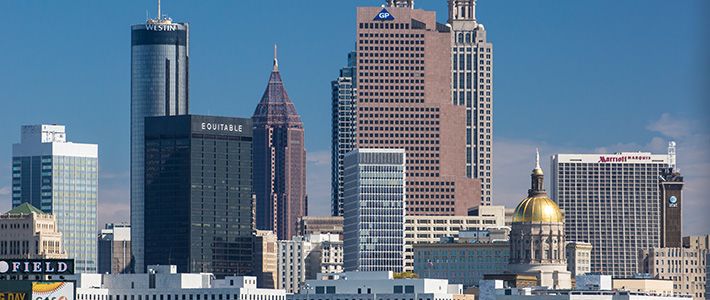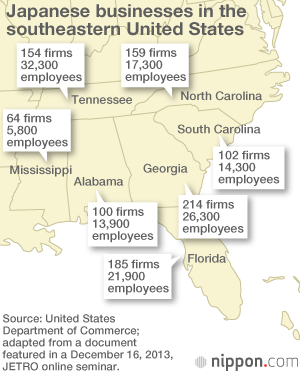
Japanese Corporations Find Their Way Down South
Economy- English
- 日本語
- 简体字
- 繁體字
- Français
- Español
- العربية
- Русский
Heading South
The 11 states generally regarded as making up the American South—Alabama, Arkansas, Florida, Georgia, Louisiana, Mississippi, North Carolina, Oklahoma, South Carolina, Tennessee, and Texas—cover more than half the breadth of the United States. Japanese corporations with operations in North America have been moving production sites to the South with increasing frequency, particularly those in the automotive, aircraft, construction machinery, and food-processing industries. US firms have also been moving south. This trend extends beyond relocating production sites to the establishment of new North American corporate headquarters.
A Wave of Investment
The Japanese firm Otsuka Chemical, for example, will soon have a new factory in Georgia where it will manufacture materials for automobile brake pads. Located in Spalding County, about 40 miles from Atlanta, the new plant is expected to commence operations in the fall. Otsuka Chemical has also moved its North American headquarters, formerly in New York, to the same site.
Another case in point is Toyota Industries, which opened a new plant at the site of an affiliate in Pendergrass, Georgia. The new plant, which began operations in 2014, produces components for automobile air-conditioning compressors—products formerly imported from Japan. Outside the automotive industry, Toppan Printing is constructing a new plant in Griffin, Georgia, where it will manufacture transparent barrier film for use in food packaging. This is just one example of the considerable amount of investment being directed at food product and packaging operations.
In 2013 Nippon Steel & Sumitomo Metal paid $1.55 billion for a high-grade steel-rolling plant in Calvert, Alabama. The plant was purchased from the German firm ThyssenKrupp. In early 2015 Dai-ichi Life Insurance acquired the mid-size US firm Protective Life, located in Birmingham, Alabama. The deal, for which Dai-ichi paid $5.7 billion, was the most expensive acquisition ever by a Japanese life insurer.
The Japanese firm Toray Industries, which already has a production site in Alabama, is planning to build a carbon-fiber plant in South Carolina to provide materials for the aircraft industry. With the addition of the new $1 billion facility, Toray will continue to supply materials for existing aircraft and will also be the sole supplier of carbon fiber for Boeing’s next-generation 777X passenger jet for the next 10 years.
In Florida, Hisamitsu Pharmaceutical acquired Noven Pharmaceuticals, a Miami firm that manufactured transdermal patches for women, among other products, for $430 million in 2014. More recently, in a deal worth up to $650 million, the Japanese pharmaceutical maker Daiichi Sankyo has begun collaborating with Charleston Laboratories, a research organization in Jupiter, Florida, to develop and sell pharmaceutical products designed to relieve pain and reduce nausea. In 2013 the Japanese hair-product maker Aderans acquired Hair Club, a “hair replacement” firm with headquarters in Boca Raton, Florida.
Corporate Offices, Too
The South is gaining corporate headquarters as well. The German automaker Mercedes Benz has announced plans to move its US headquarters from Montvale, New Jersey, to Sandy Springs, Georgia. BMW, another German firm, is currently expanding its sports utility vehicle plant in Spartanburg, South Carolina, and plans to make it the largest BMW factory in the world.
Among Japanese firms, Toyota announced in April 2014 that it would move its North American headquarters from Torrance, California, to Plano, Texas, just north of Dallas. For companies in the automobile industry, a location in the South offers relatively convenient proximity to production facilities in Mississippi or Tennessee. This does not explain, though, why the South has become such an appealing destination across the board. Other factors are at work.
Tax Breaks and Cheap Labor
From the perspective of a multinational corporation, the South offers some key advantages over other regions of the country: cheaper labor, a lower cost of living, and relatively little traffic. It has a large labor pool that will work for lower wages than in the Midwest, the traditional home of American manufacturing. Land is fairly cheap, and unions are comparatively weak, so there is little risk of labor trouble.
In addition, production sites in the South are generally easy to get to. For the past 17 years the region’s principal airport, Hartsfield–Jackson Atlanta International, has seen more passenger traffic than any other airport in the world. Atlanta is a hub, so flights are available to every other part of the country.
The southern state of Florida is presenting itself as an attractive place to do business. Florida has no personal income tax, and its Republican governor, who was reelected last November, has proposed to eliminate state corporate income taxes within 18 months.
In light of all these factors it seems likely that more business and investment, whether American, European, or Japanese, will be heading south.
Georgia on Their Minds
 The state of Georgia is a favored destination for corporations feeling the southward pull. According to the state government, over the past six years 120 businesses in the automobile industry have made combined direct investments of $5 billion in Georgia, creating 18,000 new jobs. Following the closing of a Ford plant near the Atlanta airport in 2006 and the closing of a General Motors plant in northeastern Atlanta in 2008, Georgia saw an increase in new investment, mainly by the Korean firm Kia Motors and other foreign automakers.
The state of Georgia is a favored destination for corporations feeling the southward pull. According to the state government, over the past six years 120 businesses in the automobile industry have made combined direct investments of $5 billion in Georgia, creating 18,000 new jobs. Following the closing of a Ford plant near the Atlanta airport in 2006 and the closing of a General Motors plant in northeastern Atlanta in 2008, Georgia saw an increase in new investment, mainly by the Korean firm Kia Motors and other foreign automakers.
Businesses in the construction-equipment industry have become concentrated in the South as well. The Atlanta area has seen a notable influx of Japanese component manufacturers and specialized trading firms. The Japanese manufacturer Komatsu began its manufacturing operations in the United States at a plant in southern Tennessee in 1985 and built a new plant in South Carolina in 2001. Hitachi Construction Machinery, another Japanese firm, has cooperated in a joint venture in North Carolina with the US firm Deere & Company since 1988. Kubota Corporation, also from Japan, is expected to build a new plant in the United States capable of producing 5,000 small-scale construction machines per year by 2017.
American Manufacturing Redux
Chinese businesses have established a presence in the South as well. In 2009 the construction-equipment division of the Sany Group, a Chinese corporation, commenced operations at a plant in suburban Atlanta. Foreign investment is not the whole story, though. In 2013 the US firm Caterpillar began producing bulldozers and miniature hydraulic shovels at a new plant in eastern Georgia, a development described by some as signifying the return of manufacturing in the United States.
Unlike Japan, the United States is expected to see its population rise in the future, and a greater-than-average population increase is foreseen for the South. The attendant need for new housing and infrastructure and the need to provide for a host of new property owners are expected to result in higher demand for small-scale construction equipment.
Originally written in Japanese and published on April 24, 2015. Banner photo: Atlanta, a focal point for new investment by a host of international corporations based in Japan and elsewhere. (Photo by Jon Arnold Images/Aflo.)